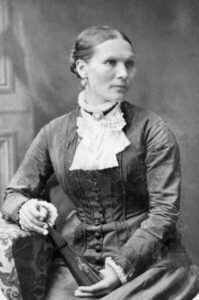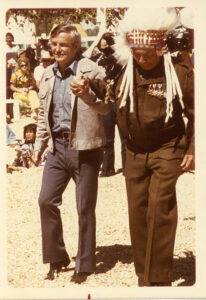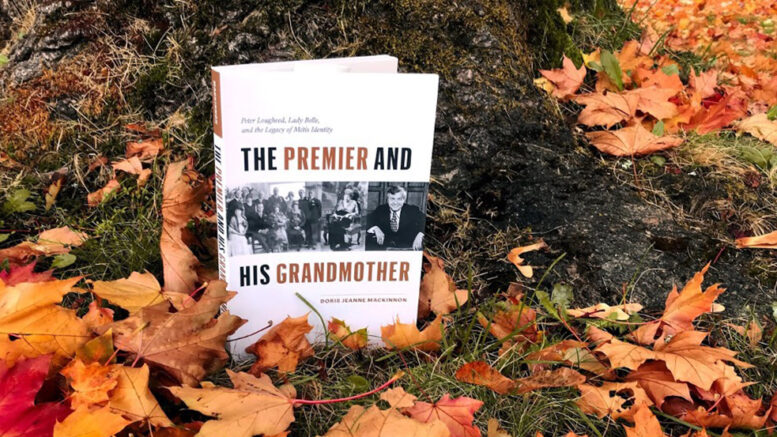By Chevi Rabbit, Local Journalism Initiative Reporter
(ANNews) – In her latest literary masterpiece, “The Premier and His Grandmother: Peter Lougheed, Lady Belle, and the Legacy of Métis Identity,” Dr. Doris J. MacKinnon, delicately unravels the familial ties binding former Alberta Premier Peter Lougheed to his Métis grandmother, Isabella Clark Hardisty Lougheed.
For MacKinnon, an academic in North American Indigenous history, who is from northeastern Alberta, this exploration signifies a profound stride in her personal reconciliation journey. Her drive led her to delve into historical narratives, particularly those featuring pioneer Indigenous women. “Indigenous people were the original pioneers,” she declares.
The heart of MacKinnon’s exploration is recognizing the often-overlooked stories of Métis and other Indigenous women. As she puts it, “Métis Indigenous women played a crucial role in establishing pioneer communities, especially during the transition from the fur trade to a more sedentary economy.”

Mary Anne Allen (Thomas). Peter Lougheed’s great-grandmother, whose ancestors were the Chinook people of the Pacific Northwest. Peter displayed this photo in his home and kept a copy in his personal papers now held by the Provincial Archives of Alberta. Photo courtesy Libraries and Cultural Resources Digital Collection, University of Calgary, NA-2758-1.
MacKinnon highlights the importance of Indigenous women’s contributions: “Many of the original pioneer women were Indigenous Métis women, actively contributing to the establishment of the first hospitals, literary clubs, and social services in pioneer communities. These women became the backbone of support in areas lacking essential services.”
Regrettably, the stories of Métis and First Nations women often remain obscured in history. “The history of Indigenous women and their significant contributions to Canada are often obscured. These original pioneers settled on the prairies, overcoming challenges. Sadly, their stories are not well-documented,” she adds.
Despite the crucial roles of Metis women in pioneering communities and contributing to societal structures, their stories are seldom acknowledged. MacKinnon says, “Oral history and snippets from newspapers provide glimpses into their impactful lives.”
Isabella Clark Hardisty Lougheed, the Matriarch of the Lougheed family, was often regarded as the first lady of the Calgary area, and played a role in establishing the family’s prominence.
The Lougheeds’ wealth during the Great Depression was lost, but Isabella Clark Hardisty Lougheed’s community influence and societal impact in Calgary endured. Their grand home, now designated a national historic site, bears witness to the enduring contributions that shaped the city’s identity. Once the first to boast electric power in southern Alberta, this residence symbolizes the pioneer spirit that shaped Canada.
Isabella Clark Hardisty Lougheed’s legacy extends beyond the walls of her historic home. As a key figure in Calgary’s social landscape, she hosted many visitors, including royalty, in an era where personal homes doubled as accommodations for dignitaries. This hospitality became integral to establishing Calgary as an essential hub in Canada.
Isabel Hardisty Lougheed’s legacy left an indelible mark on the pages of Canadian history and it continues to resonate through the corridors of time.

Peter Lougheed attending the ceremony in which he was honoured with the Kainai Chieftainship. Photo Courtesy The University of Alberta Archives, Accession # UAA-2012-046-013-1979 F22.
Reflecting on the challenges faced by Métis people, MacKinnon notes, “There was a time when they were called the hidden people because if they could survive by claiming a non-Indigenous identity, that was sometimes a necessary choice.”
But MacKinnon says, “For Isabel Hardisty Lougheed, the sense is that she was open about her Métis Indigenous identity and never hid it.”
Joe Lougheed, the son of Alberta’s former Premier, Peter Lougheed, provides profound insights into the significance of their Métis heritage. He told ANNews, “My father always acknowledged his Métis Indigenous ancestry.
“In our household, a cherished photograph adorned the walls—my father, Peter Lougheed, proudly showcasing his great-great-grandmother, Mary Allen, a Métis woman. I inherited my father’s comprehensive library, dedicated to Métis history and the Hudson’s Bay Company.”
For Joe, the Métis identity isn’t a mere historical footnote but a proud legacy spanning generations. He proudly states, “My family is proud of our Métis identity; I can trace my heritage back through multiple generations. I’m honoured to be accepted by the Métis community in Alberta. The inclusion of Métis in the Constitution marked a fundamental moment in history.”
Although Peter Lougheed didn’t overtly display his Métis history, Joe emphasizes that his father regularly spoke about it and took pride in it. The constitutional negotiations, a nuanced negotiation, saw the debated but crucial decision to include Section 35. This marked the first time Métis were recognized in the Constitution of Canada. The inclusion is a constitutional milestone, in the Métis of Alberta’s recent move toward self-government, symbolizing one of many steps in their ongoing struggles for recognition and significance in Alberta.
Joe further reflects on the importance of pride in one’s past and open discussion. “People should take pride in their past and openly discuss it for reconciliation. Sharing these stories is a way of passing on the history of our country to the next generation.”
The narrative captures readers with a compelling story of Peter Lougheed and his grandmother, shedding light on their Métis heritage, struggles, and profound impact on Alberta’s history. MacKinnon’s work is dedicated to unearthing stories contributing to the broader narrative of Indigenous identity and the challenges the Métis community faces. Through individual stories and the overarching historical context, the book contributes to understanding the significance of Métis heritage in Alberta and Canada.
For more information on Dr. Doris J. MacKinnon’s book and her exploration of Métis identity, you can visit her website at www.dorisjeannemackinnon.ca



Be the first to comment on "New book explores the Métis pioneer legacy in Alberta: ‘The Premier and His Grandmother’"